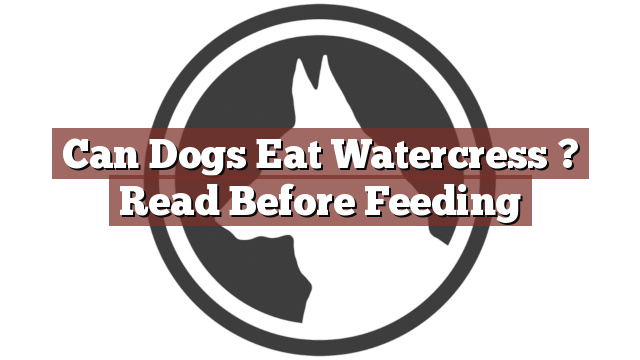Understanding Your Dog’s Dietary Needs
Just like humans, dogs have specific dietary needs that should be met in order to maintain their overall health and well-being. While it is important to provide dogs with a balanced and nutritious diet, it is equally crucial to be aware of foods that may be harmful to them. This is because certain foods that are safe for humans can be toxic or cause digestive issues in dogs. So, before introducing any new food into your dog’s diet, it is essential to do thorough research to ensure its safety.
Can Dogs Eat Watercress? Read Before Feeding
Can dogs eat watercress? The answer is yes, dogs can eat watercress. Watercress is a leafy green vegetable that belongs to the Brassicaceae family, which also includes vegetables like broccoli, kale, and cabbage. It is packed with vitamins A, C, and K, as well as minerals like calcium and iron. Watercress is low in calories and high in antioxidants, making it a healthy addition to your dog’s diet when given in moderation.
However, it is important to note that while watercress is generally safe for dogs, some dogs may be allergic to it. If your dog has never consumed watercress before, it is recommended to introduce it gradually into their diet and observe for any allergic reactions or gastrointestinal upset. Additionally, always wash watercress thoroughly before feeding it to your dog to remove any potential pesticides or dirt.
Pros and Cons of Feeding Watercress to Dogs
Feeding watercress to your dog can have several benefits. As mentioned earlier, watercress is rich in essential vitamins and minerals that can support your dog’s overall health. The high vitamin C content in watercress can boost your dog’s immune system and help fight against infections and diseases. The leafy green vegetable also contains phytonutrients, which have anti-inflammatory properties that can be beneficial for dogs with joint issues or allergies.
However, it is important to keep in mind that watercress should only be given to dogs as an occasional treat or as a part of a well-balanced diet. Feeding excessive amounts of watercress can lead to digestive upset, such as diarrhea or upset stomach. Additionally, the high oxalate content in watercress may not be suitable for dogs with a history of calcium oxalate bladder stones, as it can potentially contribute to the formation of these stones.
Conclusion
Can a dog eat watercress? Yes, dogs can eat watercress, but it should be given in moderation. Watercress can provide several health benefits for your furry friend due to its rich nutrient profile. However, it is important to introduce watercress gradually into your dog’s diet and monitor for any adverse reactions. If you are unsure about feeding watercress to your dog or if your dog has any underlying health conditions, it is always best to consult with your veterinarian for personalized advice regarding your dog’s dietary needs.
Thank you for taking the time to read through our exploration of [page_title]. As every dog lover knows, our furry friends have unique dietary needs and responses, often varying from one canine to another. This is why it's paramount to approach any changes in their diet with caution and knowledge.
Before introducing any new treats or making alterations to your dog's diet based on our insights, it's crucial to consult with a veterinarian about [page_title]. Their expertise ensures that the choices you make are well-suited to your particular pet's health and well-being.
Even seemingly harmless foods can sometimes lead to allergic reactions or digestive issues, which is why monitoring your dog after introducing any new food item is essential.
The content provided here on [page_title] is crafted with care, thorough research, and a genuine love for dogs. Nevertheless, it serves as a general guideline and should not be considered a substitute for professional veterinary advice.
Always prioritize the expert insights of your veterinarian, and remember that the health and happiness of your furry companion come first.
May your journey with your pet continue to be filled with joy, love, and safe culinary adventures. Happy reading, and even happier snacking for your canine friend!

